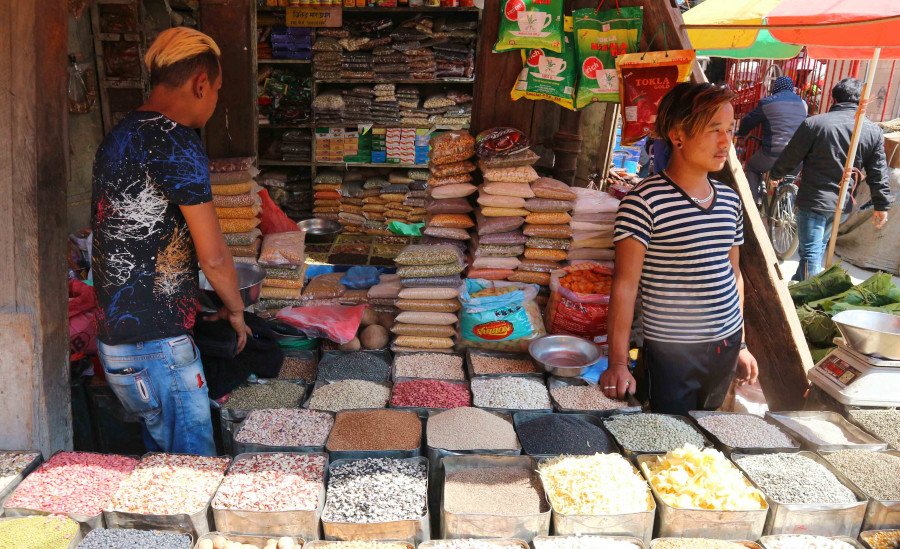Money
Market prices rocket while officials busy themselves with election
Consumer activists and economists say that the recent increase in prices is the result of lack of market inspection.
Krishana Prasain
Unscrupulous merchants are having a field day with the entire administrative machinery tied up with the elections, and nobody to check the goings-on in the market, consumer rights activists say.
The price of edible oil had soared to a historic high as a result of the Russia-Ukraine war and a stronger United States dollar, but it came down sharply during the Dashain and Tihar festivals.
Prices are up once again amid the commotion of the election. Edible oil has become costlier by up to 20 percent for no other reason than lack of monitoring, say insiders.
“From the police administration to government officials, all are engaged in the elections. Unscrupulous traders are jacking up the prices. No one is bothered to check the market,” said Madhav Timalsina, president of the Consumer Rights Investigation Forum.
He described the inflation triggered by the elections as “artificial and unnatural”. "Prices have increased as traders are fixing them on their own," he said.
“On the pretext of rising international prices, domestic traders have been hiking the prices of goods unnaturally," Timalsina said. "Disruptions in the supply chain are being taken as a chance by opportunist traders.”
According to Nepal Rastra Bank, the year-on-year consumer price inflation stood at 8.50 percent as of mid-October, which is the end of the first quarter of the fiscal year. The figure was 4.24 percent in the same period a year ago.
Since February, Nepal's import-driven economy has been hit by high prices due to the Russia-Ukraine war. On February 24, 2022, the Russian Federation invaded Ukraine as tensions between the two erupted into open warfare. The fighting choked global supply chains and the repercussions were felt in Nepal too.
“The price of goods has increased by around 4 to 20 percent, depending on the item since the beginning of the election campaign in early November,” said Amul Kaji Tuladhar, general secretary of the Nepal Retailers Association.
“As the election candidates collect donations from traders and business firms, they pass on the burden to consumers by increasing the mark-up on goods,” Tuladhar said. “That’s why elections are always an expensive affair.”
The price of edible oil has increased by Rs30-40 per litre to Rs280-290 per litre. "The price of edible oil had dropped to Rs220 per litre before the election campaign," Tuladhar said.
The price of rice has increased by Rs15-20 per kg while lentils and legumes have become dearer by Rs15 to Rs25 per kg, according to retailers.
Although the Indian government has lifted restrictions on rice exports, no effect has been seen in prices in Nepal, retailers say.
On September 9, India, the world's largest grain exporter, had banned exports of broken rice and slapped a 20 percent customs duty on various types of rice, except parboiled and basmati rice.
The repercussions were felt immediately in Nepal as the price of imported long grain and fine rice saw the single largest jump of Rs10 per kg. In November, following repeated appeals from Nepal, India cleared a shipment of 600,000 tonnes of duty-free paddy.
Food and beverage inflation has been recorded at 8.05 percent, while non-food and service inflation reached 8.85 percent, a central bank report said.
The price of cereal grains has increased by 8.19 percent. The price of pulses and legumes has swelled by 5.98 percent, vegetables by 3.62 percent, meat and fish by 7.06 percent, and milk products and eggs by 9.45 percent.
Similarly, the price of ghee and oil has increased by 7.89 percent, fruits by 12.06 percent, sugar and sugar products by 7.17 percent and spices by 5.08 percent.
The price of non-alcoholic drinks has risen by 8.22 percent while alcoholic drinks and tobacco have become costlier by 10.24 percent and 8.44 percent respectively. Restaurant and hotel prices have gone up by 12.30 percent in the review period.
Economists have warned that massive campaign spending by political parties during the general elections could push up price levels.
Consumer rights activists and economists say that the rise in prices of food and non-food items in recent weeks is the result of lack of market inspection.
"A hike in interest rates, liquidity crunch in the banking system, six-month-long import ban on certain goods, and requirement to keep 100 percent margin amount to open a letter of credit had already made goods more expensive," Timalsina said.
“The government has not taken a single step to check rising inflation.”
Nepal Oil Corporation continues to charge high prices even when the cost of oil on the international market has tumbled. Costly fuel has added to the pain of Nepalis struggling under high inflation.
According to Nepal Oil Corporation, the price of petrol has swelled by 28.17 percent to Rs181 per litre in the past year, while diesel and kerosene prices rose by 36.51 percent to Rs178 per litre.
The price of LPG or cooking gas increased by 19.44 percent to Rs1,800 per cylinder.
Economist Puskar Bajracharya says that rising demand for goods during election season keeps up inflationary pressure, and it may continue even after the election.
"Despite high demand, market supervision declines during election time, and opportunist traders take market advantage," he said.
Campaign spending pushes up prices for a few months after the election. “The inflationary price pressure can remain for around two months,” Bajracharya said.




 18.12°C Kathmandu
18.12°C Kathmandu













